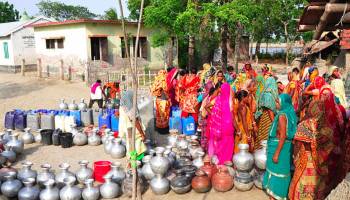Renewable Energy for Australia’s Security: Integrating Domestic and Foreign Policy
In the last few years, debate has raged over Australia’s energy, environment and climate change policies.
While the primary technologies of renewable energy generation and storage are well understood, the challenge of how to export this energy remains.
As a wealthy and capable middle power, Australia has a mix of interests and responsibility in regional and international leadership.
Tackling climate change is not only a matter of costs: productive energy change will grow and strengthen Australia’s economy, foreign relations, and security. Unifying domestic and foreign policy on the energy front would be a bold step forward to a strong, vibrant Australia in the 21st century.
[ > Australian Institute of International Affairs — December 10, 2019 ]
Pushing Back Delhi’s ‘Day Zero’
Understanding preference heterogeneity in electricity services
Using a discrete choice experiment examining the potential role of domestic appliance curtailment contracts as a means of shifting load, this paper investigates potential drivers of preference heterogeneity with respect to electricity services.
Among the research findings are that almost 4-in-5 customers engage with the proposition of appliance curtailment contracts within the context of the survey environment.
From a policy perspective the results highlight the potential of appliance curtailment contracts as a tool to manage peak loads, as well as, the nature of preferences with respect to curtailment contract attributes.
[ > Economic and Social Research Institute — October 15, 2019 ]
Privacy and security policies lag biometric data use
Climate intensity imperils leaders who don’t keep up
For too long, political leaders could tick the box on climate change by expressing their deep, abiding concern, introducing largely cosmetic policy changes, then carrying on with business as usual.
In Canada, massive fossil fuel subsidies have continued with a nod and a wink, with self-styled climate leaders like British Columbia Premier John Horgan still finding billions in tax breaks for liquefied natural gas developments that will utterly defeat an otherwise solid effort at an ambitious provincial carbon target.
Climate intensity scarcely existed when Canadians last went to the polls, but it’s surging today.
With much of eastern Canada still recovering from epic floods, and the West heading into wildfire season, the demand for real action and consistent policies could become an irresistible force on the campaign trail.
[ > Institute for Research on Public Policy — June 5, 2019 ]






